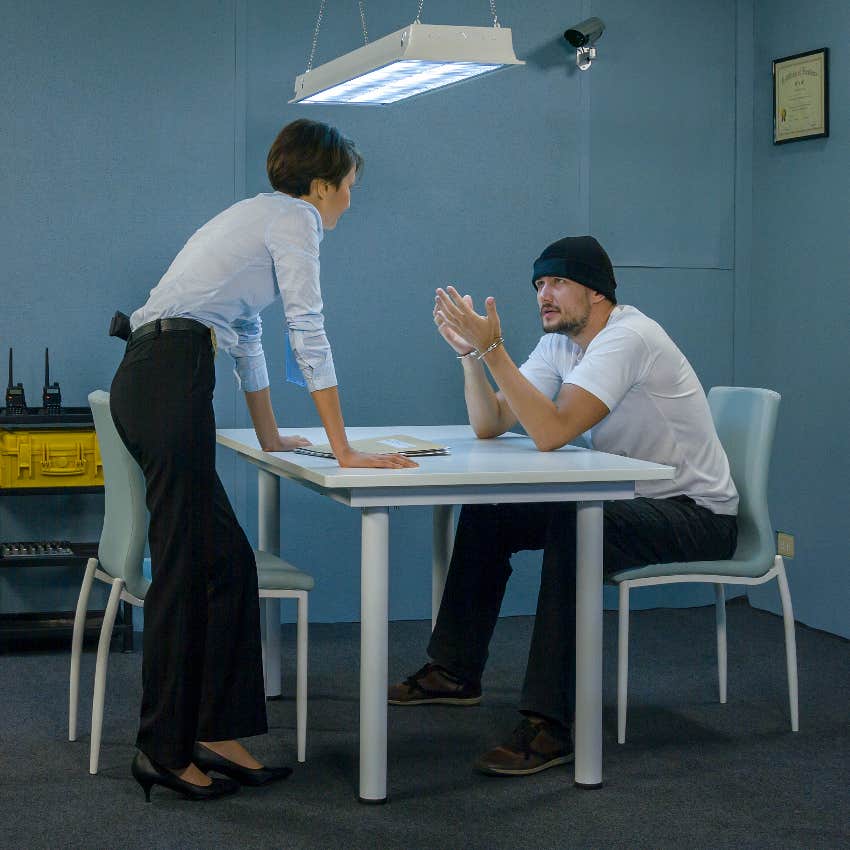5 Sneaky Ways Skilled Interviewers Get The Information They Need
Hint: It's the opposite of what television shows you.
 Jacob Lund | Shutterstock
Jacob Lund | Shutterstock He wasn’t sweating or fidgeting — he just sat, arms folded and looking toward the floor as he described how he purchased heroin in bulk. He had made himself wealthy while poisoning the town he called home.
Police interrogations aren’t what Hollywood shows you. There is no sweaty, disheveled detective yelling profanities at a scared man handcuffed to a table. It’s not aggressive or demeaning. It’s two or three people sitting in a room, talking like old friends. Well, at least that’s what it looks like when it’s done correctly. So, how do you get someone to tell you something they’d prefer to keep hidden? The answer is simple, but getting there is anything but.
You make the truth more appealing than the lie.
This man I was interviewing that day wasn’t just a drug dealer. He ran a small criminal empire and employed (for lack of a better term) about a dozen other drug dealers. That empire sold drugs to kids, shot rivals, and intimidated the honest people who had the unfortunate luck of living in the neighborhood his goons controlled. We could prove he sold drugs and even make a good argument that he ran the empire. But proving that he was the “kingpin” was going to be a challenge. I needed him to tell me that he was in charge, but there was no earthly reason for him to give me that information.
You know where this is going, don’t you? After about two hours, he told me that very thing. Why? There are many reasons, most of which have roots in psychology and human behavior, which I study currently. In addition to the various interview and interrogation schools I’ve attended, I’m currently wrapping up a graduate degree in psychology. It’s only now at the end of my master’s program, that I fully realize why the techniques listed below work. They don’t work with everyone, but that’s to be expected. There are very few absolutes in human behavior.
Police interrogations should rarely elicit confessions. The person being interviewed usually has little to gain by giving up their secrets, yet they do. Every day, people sit in interviews and spill the beans. Based on my years of experience, I want to offer five ways skilled interviewers get the information they need using techniques you can use in your relationships.
Here are 5 sneaky ways skilled interviewers get the information they need:
1. They make truth equal freedom
Research shows that keeping secrets creates stress. Did you also know that it can increase feelings of loneliness and isolation? People generally move in two directions: toward pleasure or away from pain. Stress, loneliness, and isolation cause pain that never really goes away. It festers and grows. If you want the truth from someone, help them move away from pain. A part of them is screaming inside to blurt out the truth.
President James Garfield once said, “The truth will set you free, but first, it will make you miserable.” Make sure they know that telling the truth is the only way to be happy, even if it is hard to say.
2. They build rapport
I cannot emphasize this enough: find a way to relate to the person you are talking to. If it’s a stranger, talk to them as long as you need about nothing at all. Your goal is to find commonalities and ways to relate. Those things take you from a stranger to a relatable person. That’s the beginning of trust. If you know the person well, rapport looks different. You want to knock the walls down. Avoid heavy conversation and talk about something you agree on. Share a laugh or a smile. The point is you’re unlikely to get anyone to share anything personal with you if the context is adversarial.
3. They share personal stories
Humans have a natural urge to reciprocate. If you hold the door for someone, they will hold it for you when given a chance. It’s an unspoken law of being human that holds up even in interviews and interrogations. If you share nothing, you are far more prone to get nothing in return. If you’re trying to get a secret from a friend, family member, or spouse, don’t just seek to take information. Give it in return. Share what’s on your mind and tell a revealing personal story. To get it, you’re going to need to give. This is a common-sense point.
4. They make silence their friend
People avoid the “awkward silence” at just about any cost. Have you ever run into an old acquaintance and said hello, only to realize you’re still looking at each other with nothing more to say? It feels awful, but it is necessary to achieve your goal. In interviews, suspects usually fill that silence with words. Whether those words are truth or lies doesn’t much matter. What matters is they are talking and giving you data — things that can lead to new questions or answer old ones. Try to use that uncomfortable feeling to your advantage. That means pairing it with steady eye contact, another action many people find uncomfortable. With practice, you can gain this skill.
5. They figure out what the person that needs to be interviewed needs, then they give it to them
In the drug dealer’s example, it became apparent that he craved respect and adulation. Sure, he wanted to make money and drive nice cars, but those were secondary motivators. He wanted respect and status above all else. He talked about himself, and I listened. I even complimented him when he was incredibly proud of something. I gave him what he wanted most. Eventually, the words I needed came out. I just gave them out, then sat back and watched. He was talking about giving the drugs to his employees. And with those words, he guaranteed he would leave prison a very old man — a shadow of the lean, youthful 25-year-old who sat in the chair before me. At that moment, he wanted me to know he was in control outside these four barren office walls. He was a man who commanded respect.
 Photo: Maxim Vasiliev / Shutterstock
Photo: Maxim Vasiliev / Shutterstock
There is no yelling, pressure, or trying to prove the other person wrong in skilled interviewing. That’s what television shows you, and that’s how many people think extracting information is done. Those tactics do not gain you the trust needed to get the information you seek.
Interviews are an exchange with the other person, like a contract. You give them attention, respect, and the chance to release a burden. In return, they (hopefully/most likely) give you the information you seek. The most potent weapon in the interviewer’s arsenal isn’t force or coercion. It’s a warm, calm demeanor and an understanding of what truly drives the person sitting across from you.
Joshua Mason is a former police detective and public safety leader turned writer. His weekly stories on Medium are dedicated to change, leadership, and life lessons.

